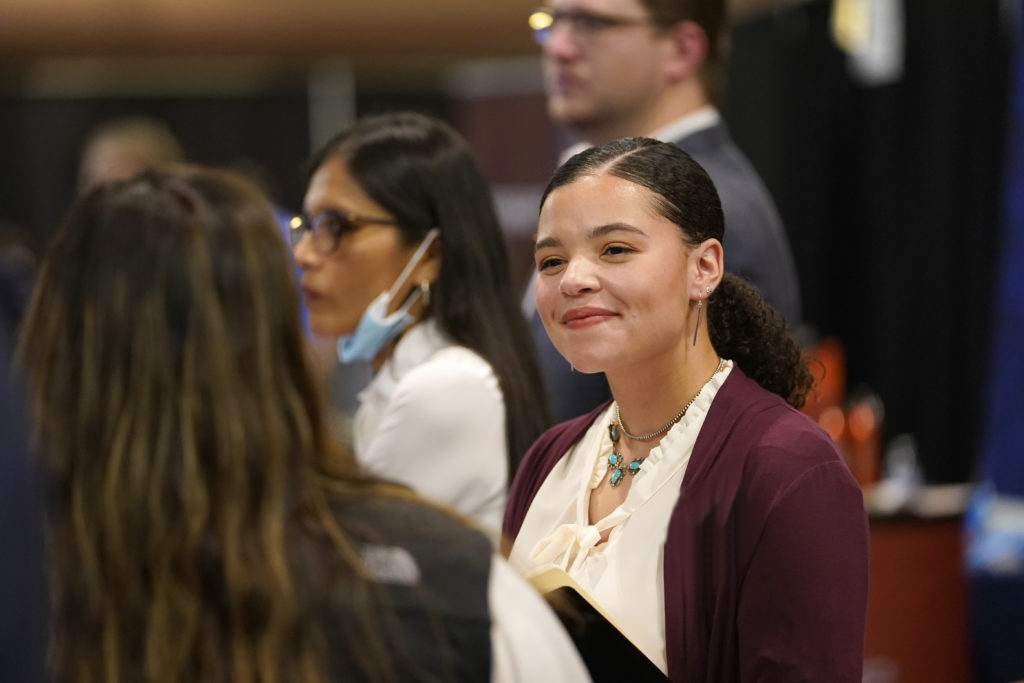
Master of Agribusiness
Students in Texas A&M’s Master of Agribusiness program learn how to use data and economic modeling to contribute to the efficient production and distribution of food, feed and fiber. Graduates can leverage the Aggie network that we have built over the degree’s 25 year history to obtain rewarding internships and management-track jobs. The Master of Agribusiness is a full-time, on campus, graduate degree program. It is not a STEM program.
The Master of Agribusiness Program was ranked No. 1 in the nation and No. 3 in the world by Eduniversal for 2019, 2020, 2021, 2022, 2023 and 2024.
Follow us on Social Media
Program Details
Our Master of Agribusiness degree is an intercollegiate program offered in partnership with the Mays Business School through the Intercollegiate Faculty of Agribusiness. The Intercollegiate Faculty members are from the Departments of Agricultural Economics, Accounting, Information and Operations Management, Management, and Marketing. This professional program is uniquely focused on the food and agribusiness sector with an emphasis on combining economic and business analysis with quantitative methods for decision-making. Students learn to conduct case-based research and work in a team in our integrated capstone courses in strategic management and financial analysis. Students also gain valuable communication and presentation skills to set them up for professional success.
Our program directors meet with students to ensure their program aligns with their unique background and career goals. The program can be completed in 16 or 20 months. Completion of a thesis is not required.
The MAB Program costs about $25,000 for Texas residents or competitive scholarship recipients and $46,000 for non-residents. These amounts exclude rent and living expenses. For more details, visit Texas A&M University’s tuition calculator and cost of attendance page #WorthIt!.
A GRE score is not required for admission.
- Degree: Master of Agribusiness, MAB
- Credit Hours: 33 total credit hours
Graduate Admissions
Texas A&M University is the premier choice to gain a graduate degree, thanks to our national academic ranking and high financial value. Joining the Aggie Family and gaining an advanced degree from Texas A&M puts students in the highest class of job candidates.
Before applying to this graduate program, applicants must have successfully completed the following four prerequisite courses with a grade of A or B: Microeconomics Theory, Macroeconomics Theory, Business Calculus, and Statistical Methods.
The Master of Agribusiness Program only accepts new students each fall semester. No exceptions.
What Do I Need to Apply?
- NOTE: GRE scores are not required
- Minimum GPR of 3.0 in the last 60 hours of undergraduate work, or 3.25 in 30 hours or more of graduate work.
- Application through the Texas A&M University GraduateCAS system
- Resume or Curriculum Vitae
- Statement of Purpose
- Three letters of recommendation, submitted online with the application. For international or non-Texas A&M Applicants only.
- Official transcripts and records, sent to the Office of Admissions.
International Students
Official TOEFL scores are required for international applicants. Official scores must be sent by ETS directly to Texas A&M University using the school code: 6003. Visit the Graduate and Professional School website for a list of requirements, exemptions and other useful information regarding the TOEFL/IELTS Exams.
Admissions Decisions
Students will receive an admissions decision either in a letter from the Texas A&M University Office of Admissions or from the department.
Scholarships and Financial Aid
By submitting a financial aid application and a scholarship application, students are reviewed for all the types of financial aid that they are eligible for. Remember: each student’s financial aid eligibility may vary. The types of financial aid students are offered is based on the data provided on their financial aid and/or scholarship application.
The Master of Agribusiness program does a competitive scholarship review of all admission applications and funding offers are made, based on eligibility and available funds each year. If a student is an international or out-of-state resident and receives a competitive scholarship of at least $1,000, they may qualify for a non-resident tuition waiver.
Prerequisites
Before applying to this graduate program, applicants must have successfully completed the following four prerequisite courses with a grade of A or B: Microeconomics Theory, Macroeconomics Theory, Business Calculus, and Statistical Methods
Math Requirements
MATH 142: Business Calculus
This course covers limits and continuity; techniques and applications of derivatives including curve sketching and optimization; techniques and applications of integrals; emphasis on applications in business, economics, and social sciences.
Statistic Requirements
STAT 303: Statistical Methods
Intended for undergraduates in the social sciences. Introduction to concepts of random sampling and statistical inference, estimation and testing hypotheses of means and variances, analysis of variance, regression analysis, chi-square tests.
Economics Requirements
ECON 323: Microeconomics Theory
This course covers determination of prices and their role in directing consumption, production and distribution under both competitive and non-competitive market situations.
ECON 410: Macroeconomic Theory
This course covers theory of the determination of aggregate levels of national income, employment and prices; monetary and fiscal policy analysis, effects of government debt and deficits.
Contact the Master of Agribusiness Program
Karen S. Lepley
Assistant Director – Master of Agribusiness
